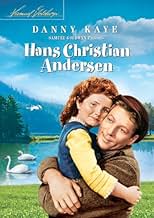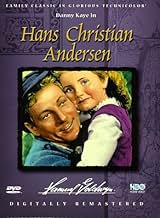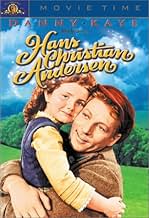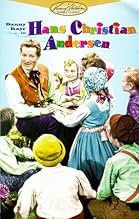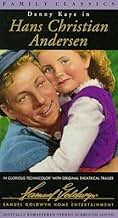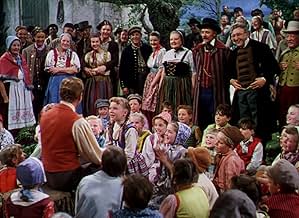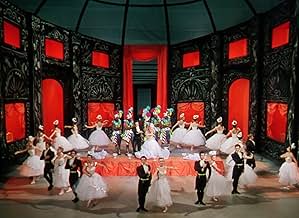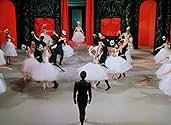IMDb RATING
6.9/10
4.5K
YOUR RATING
The opening scene of the movie describes it best: "Once upon a time there lived in Denmark a great storyteller named Hans Christian Andersen. This is not the story of his life, but a fairy t... Read allThe opening scene of the movie describes it best: "Once upon a time there lived in Denmark a great storyteller named Hans Christian Andersen. This is not the story of his life, but a fairy tale about the great spinner of fairy tales."The opening scene of the movie describes it best: "Once upon a time there lived in Denmark a great storyteller named Hans Christian Andersen. This is not the story of his life, but a fairy tale about the great spinner of fairy tales."
- Nominated for 6 Oscars
- 10 nominations total
Zizi Jeanmaire
- Doro
- (as Jeanmaire The Famous French Ballerina)
Joseph Walsh
- Peter
- (as Joey Walsh)
Peter J. Votrian
- Lars
- (as Peter Votrian)
Lee Aaker
- Little Boy
- (uncredited)
Patsy Bangs
- Dancer
- (uncredited)
Arthur Berkeley
- Townsman
- (uncredited)
Featured reviews
So the opening written words say to us the very thing that many across the movie forums have failed to spot, namely that they wasn't going for first tier autobiographical on this! just a celebration of the name and his work is all.
Who better to bring the great Dane to the screen than the ebullient Danny Kaye, his exuberant approach to the topic befits the glorious colour that positively sparkles in every frame of Charles Vidor's film.
The story tracks the Cobbler Andersen as he leaves his hometown of Odense to seek a new life in the beautiful city of Copenhagen. It is here that he becomes known for his stories that bring about much joy to the children of Denmark - and here that he writes his glorious ballet version of The Little Mermaid. He gets into scrapes, he falls for a pretty girl, and most of all he discovers his vocation in life, this is indeed a delightful fairytale in itself.
Sit back and enjoy The Emperor's New Clothes, Wonderful Copenhagen, Thumberlina and The Ugly Duckling, and then fall silenct for the 15 minute showing of The Little Mermaid in all its balletic glory. Hans Christian Andersen is a smashingly buoyant film, one that may come wrapped up in treacle for some folk, but for those of us with a sweet filmic tooth then the pleasures are there to be had. 8/10
Who better to bring the great Dane to the screen than the ebullient Danny Kaye, his exuberant approach to the topic befits the glorious colour that positively sparkles in every frame of Charles Vidor's film.
The story tracks the Cobbler Andersen as he leaves his hometown of Odense to seek a new life in the beautiful city of Copenhagen. It is here that he becomes known for his stories that bring about much joy to the children of Denmark - and here that he writes his glorious ballet version of The Little Mermaid. He gets into scrapes, he falls for a pretty girl, and most of all he discovers his vocation in life, this is indeed a delightful fairytale in itself.
Sit back and enjoy The Emperor's New Clothes, Wonderful Copenhagen, Thumberlina and The Ugly Duckling, and then fall silenct for the 15 minute showing of The Little Mermaid in all its balletic glory. Hans Christian Andersen is a smashingly buoyant film, one that may come wrapped up in treacle for some folk, but for those of us with a sweet filmic tooth then the pleasures are there to be had. 8/10
10arosedec
This was the movie that caused me to fall in love with Danny Kaye. I still love watching this movie more than 20 years after I saw it for the first time on television. I love his gentle nature with the children, in particular the little girl he sings "Thumbalina" to. Fabricated or not, this is one of his best films showing the true diversity of an incredibly talented man. Danny Kaye was surely one of the last of a dying Hollywood breed.
A lot of the comments previously made here are true and this certainly isn't any kind of real biographical film of Hans Christian Anderson. But one must remember that Samuel Goldwyn was primarily making this film as children's entertainment. And on that level he succeeded brilliantly.
In fact at the age of 5 in the cinema in Brooklyn this was the first movie on the big screen I ever remember seeing. My father was a big Danny Kaye fan so the whole family went to see it. And of course one of the first long-playing records we had in our house was the soundtrack to that film.
Another reviewer said that Frank Loesser's score was the highlight for him in the film. I don't think Danny Kaye ever had better material to sing with on the screen. Up to this point he got by with stuff especially written for him by his wife Sylvia Fine. He proved here in Hans Christian Anderson that he could definitely succeed without it.
Anyway when I view this film I'm five years old again. You will be too if you see it.
In fact at the age of 5 in the cinema in Brooklyn this was the first movie on the big screen I ever remember seeing. My father was a big Danny Kaye fan so the whole family went to see it. And of course one of the first long-playing records we had in our house was the soundtrack to that film.
Another reviewer said that Frank Loesser's score was the highlight for him in the film. I don't think Danny Kaye ever had better material to sing with on the screen. Up to this point he got by with stuff especially written for him by his wife Sylvia Fine. He proved here in Hans Christian Anderson that he could definitely succeed without it.
Anyway when I view this film I'm five years old again. You will be too if you see it.
Watching this again (for only the second time) last night, I was just knocked out by the score. Presumably because of a Broadway-is-better-than-Hollywood bias, the piece tends to be dismissed in the Loesser oeuvre but every single number is a gem -- and the fullest score for a "family fantasy" since THE WIZARD OF OZ. I was particularly taken by INCH WORM, a really short song sung in counterpoint to the children's chanting of their mathematic tables after the schoolmaster has dragged them away from Hans' tales. Not long enough to have a commercial future (outside of a soundtrack album) it tells us more about Hans than most of the scene that precedes it.
As others have noted, Danny Kaye is totally bearable and the kitsch side of the film is now enjoyable for that. (The colours also recall WIZARD.)
This film deserves more recognition in the world of original film musicals. It's a rare classic score at the time of composer compilations or Broadway imports.
As others have noted, Danny Kaye is totally bearable and the kitsch side of the film is now enjoyable for that. (The colours also recall WIZARD.)
This film deserves more recognition in the world of original film musicals. It's a rare classic score at the time of composer compilations or Broadway imports.
Every single biopic of a creative artist tells the same story, whether it's true or not: the Philistine World, or some part thereof, rejects the artist, and fails to see his greatness; but later on, perhaps during his lifetime, perhaps not, it sees the error of its ways. That happens here. Hans Christian Andersen is a village cobbler whose compulsive inventiveness is little thought of until he makes good in Copenhagen, after which...
But there's much more going on.
There's no doubt that Andersen was a great artist, in some sense. `The Ugly Duckling' and `The Emperor's New Clothes' are two of the greatest short stories - fables, folktales - all of these - ever composed. But he had his limitations. There were many kinds of stories he just couldn't write. His fertile talent for anthropomorphising was often a millstone. In many respects he seems to have been a childish and naive man. But get this: all of these limitations make it onto the screen. Both the story and Danny Kaye's performance (a great performance) make Andersen into a human being who is NOT the greatest storyteller since Shakespeare, but who can be admired for what he is.
The main story isn't the `unrecognised genius' bit: it's a story of unrequited love. While in Copenhagen Andersen spends most of his time banging his head against the wall over an unattainable ballerina, whose interest in him is, as they say, purely professional. He manages to be quite cruel to a close friend in the process, right up to the point where it's unclear that a reconciliation is possible. (Indeed, it's unclear whether or not one occurs.) When he realises what a fool he's been he just trudges back, defeated, to his village. And it's here we have the obligatory scene where the villagers realise how great he was after all, mainly by singing the highly memorable refrains of the movie's songs, one after the other. Well, the film needed some ending. I'm inclined to forgive this one.
There's also a lengthy Little Mermaid ballet - seven minutes long? more? - danced in its entirety. (We see a LOT of the ballerina's craft in Copenhagen.) This sort of thing wasn't too unusual in the 1950s but it's a genuine gamble in context - and one that I think pays off. By the time the ballet appears the cheery story of an eccentric village storyteller had become surprisingly dark. Vidor, it seems, would rather risk having people leave the cinema than insult those who remain. Good for him. I can't claim that this film works in every respect, and perhaps you won't like it, but I'm sure you won't feel cheated by it.
But there's much more going on.
There's no doubt that Andersen was a great artist, in some sense. `The Ugly Duckling' and `The Emperor's New Clothes' are two of the greatest short stories - fables, folktales - all of these - ever composed. But he had his limitations. There were many kinds of stories he just couldn't write. His fertile talent for anthropomorphising was often a millstone. In many respects he seems to have been a childish and naive man. But get this: all of these limitations make it onto the screen. Both the story and Danny Kaye's performance (a great performance) make Andersen into a human being who is NOT the greatest storyteller since Shakespeare, but who can be admired for what he is.
The main story isn't the `unrecognised genius' bit: it's a story of unrequited love. While in Copenhagen Andersen spends most of his time banging his head against the wall over an unattainable ballerina, whose interest in him is, as they say, purely professional. He manages to be quite cruel to a close friend in the process, right up to the point where it's unclear that a reconciliation is possible. (Indeed, it's unclear whether or not one occurs.) When he realises what a fool he's been he just trudges back, defeated, to his village. And it's here we have the obligatory scene where the villagers realise how great he was after all, mainly by singing the highly memorable refrains of the movie's songs, one after the other. Well, the film needed some ending. I'm inclined to forgive this one.
There's also a lengthy Little Mermaid ballet - seven minutes long? more? - danced in its entirety. (We see a LOT of the ballerina's craft in Copenhagen.) This sort of thing wasn't too unusual in the 1950s but it's a genuine gamble in context - and one that I think pays off. By the time the ballet appears the cheery story of an eccentric village storyteller had become surprisingly dark. Vidor, it seems, would rather risk having people leave the cinema than insult those who remain. Good for him. I can't claim that this film works in every respect, and perhaps you won't like it, but I'm sure you won't feel cheated by it.
Did you know
- TriviaIn order to cover the necessary camera tricks, and to add "magic" to the Little Mermaid ballet, it was decided that, rather than presenting it as an actual ballet, they would have Hans imagine how it would look. This allowed them to do things on the screen which would be impossible on the stage.
- GoofsDuring the "Wonderful, Wonderful Copenhagen" song the concertina player directly behind the singer never moves his fingers on the keys.
- Crazy creditsOpening credits: "Once upon a time there lived in Denmark a great storyteller named Hans Christian Andersen. This is not the story of his life, but a fairy tale about this great spinner of fairy tales."
- ConnectionsFeatured in Siskel & Ebert & the Movies: The Movies We Loved as Kids (1991)
- SoundtracksThe King's New Clothes
(uncredited)
Music and Lyrics by Frank Loesser
Sung by Danny Kaye and children
Reprised by Kaye, children, and Chorus in the Finale
- How long is Hans Christian Andersen?Powered by Alexa
Details
- Release date
- Country of origin
- Official site
- Language
- Also known as
- Hans Christian Andersen
- Filming locations
- Production company
- See more company credits at IMDbPro
Box office
- Budget
- $4,000,000 (estimated)
- Runtime
- 1h 52m(112 min)
- Aspect ratio
- 1.33 : 1
Contribute to this page
Suggest an edit or add missing content


